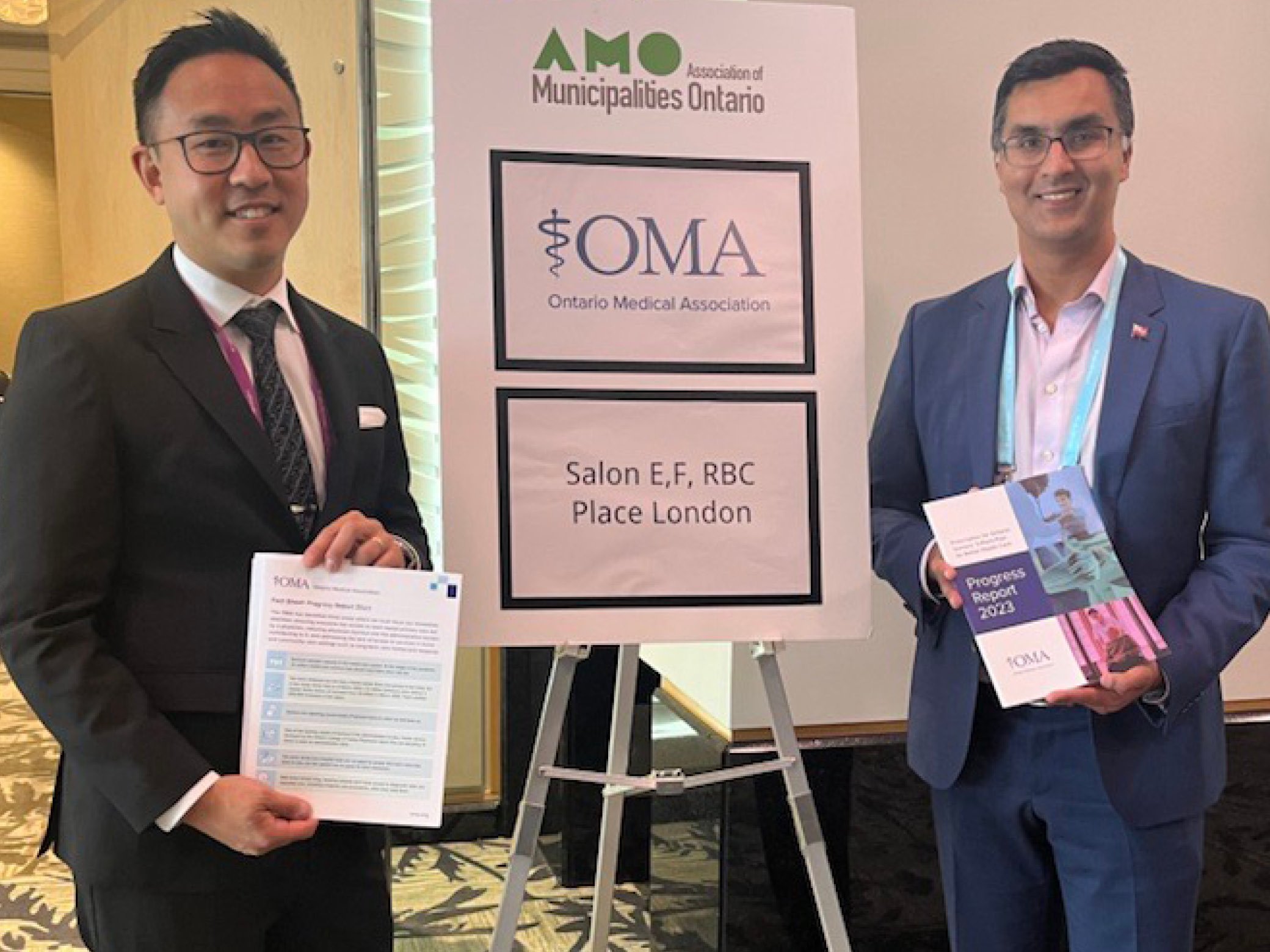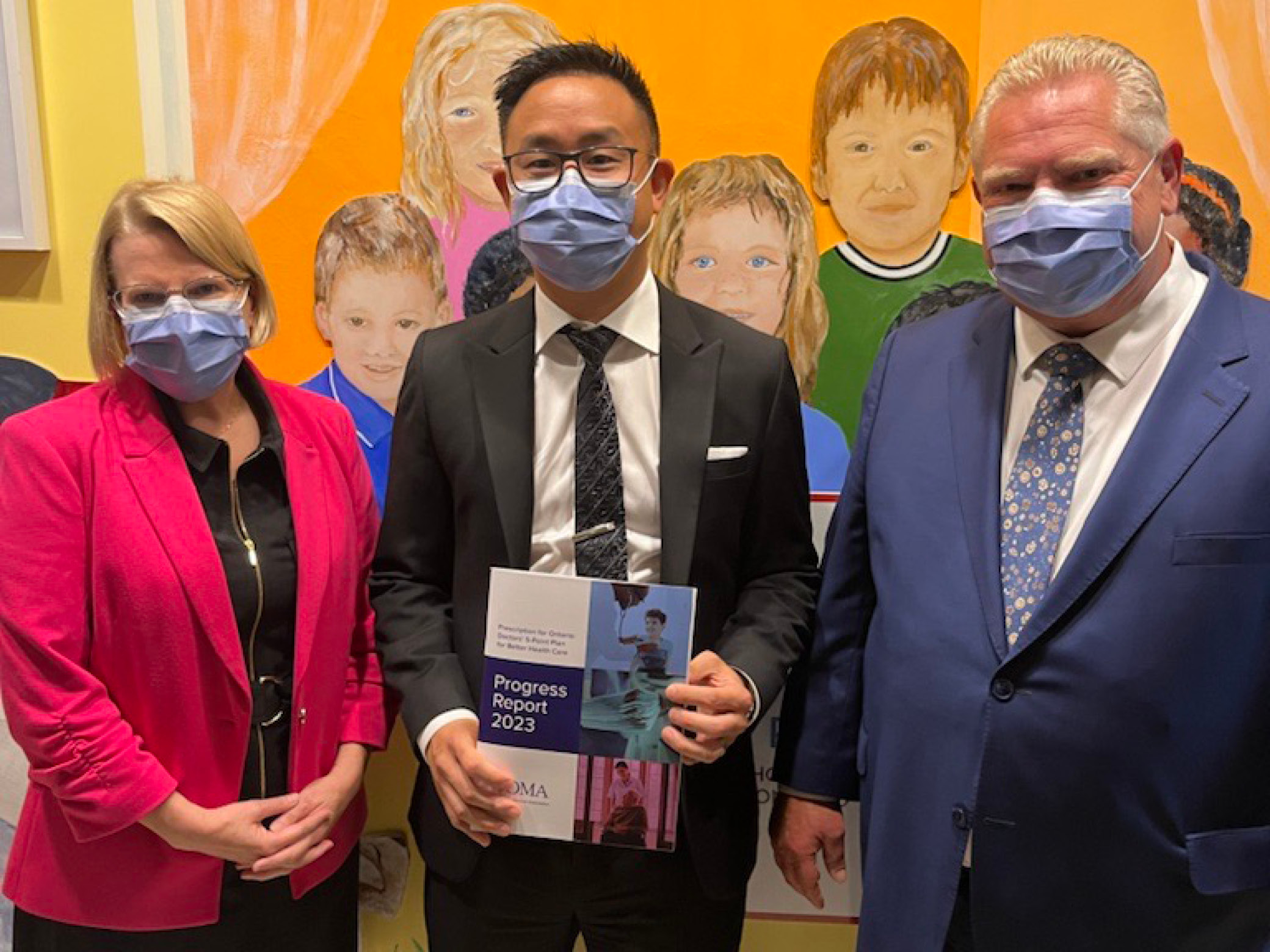Progress was made on health-care challenges in 2023, momentum will accelerate in 2024
The Ontario Medical Association led advocacy efforts for members in 2023, and worked collaboratively with the Ontario government to address the province’s health-care challenges.
In tandem with the government’s budget planning timeline, the OMA released its Prescription for Ontario: Doctors’ Solutions for Immediate Action report in October, leading up to a full day of advocacy at Queen’s Park where physicians and OMA leaders spoke about the most immediate issues in Ontario’s health-care system.
The OMA released Prescription Progress Report 2023 in May. It concluded that action had been taken on 51 of the 87 original recommendations contained in its Prescription for Ontario: Doctors’ 5-Point Plan for Better Health Care report. This is progress, but there is still much to be done.
After consultation with members, stakeholders and the public, the Progress Report identified three urgent priority areas where the OMA’s advocacy efforts should be focused: fixing the crisis in primary care, addressing physician burnout and reducing hospital overcrowding. In October, after consulting with members over the summer, the OMA released Prescription for Ontario: Doctors’ Solutions for Immediate Action, which featured 11 solutions to address the top three priority areas from the Progress Report.
OMA executives and staff continue to meet with provincial officials on a regular basis. This year saw an increase in the number of engagements between the OMA and the provincial government and the opposition parties.
Key meetings with government included:
The government has said it is committed to consulting with the OMA ahead of any health-care decisions.
Key opposition party meetings included:


The OMA called for a new program to fast-track the licensure of qualified foreign-trained physicians in Ontario. In response, the government announced the creation of the Practice Ready Ontario program for physicians. This will remove barriers for internationally educated physicians by eliminating the requirement to complete lengthy re-education programs, allowing them to practise in Ontario immediately. This program will initially add 50 new physicians to the workforce by 2024, and the OMA is advocating for its expansion.
Also in 2023, the government passed Bill 60, the Your Health Act, 2023. It enabled the creation of new integrated community health service centres in response to the OMA’s call for new community surgical and diagnostic centres to help reduce wait times and the surgical backlog. The OMA looks forward to working with the government to implement this model of care that will expand capacity throughout the health-care system. Integrating these new centres with hospitals and the broader health-care system will help ensure high-quality care and patient safety and free up beds and operating rooms for emergency, acute and complex cases.
The OMA called for an increased investment into palliative care this year to reduce the pressure on hospitals. The government responded by announcing an investment of $147.4 million over three years in communities across the province to connect more Ontarians to comfortable and dignified palliative care close to home. Of that, 45 per cent is allocated to hospice operating budgets to care for patients. The OMA has and will continue to advocate for allowing patients to remain in their preferred setting for palliative care, which is often at home or in home-like settings.
The OMA held its annual Queen’s Park Day event on Oct. 16. It was attended by more than 100 physicians, who met with more than 70 elected officials, including cabinet ministers and MPPs from all political parties, almost double the number of meetings held in the previous year. Every meeting and interaction provided an opportunity for an elected official to hear directly from members about the OMA’s recommendations from the Solutions Report.
Queen’s Park Day is a unique opportunity for the OMA’s members to advocate directly with key policy-makers. Ontario’s doctors were at the table providing leadership on key priority areas for the health-care system. MPPs have already reached out for advice since the event, including inquiries to support motions and private members’ bills.
The OMA’s Health-Care Advocate program saw a rise in participation this year. By signing up to be a health-care advocate, members receive a regular newsletter about advocacy campaigns and are invited to get involved with the OMA. Members can also meet with local MPPs and are invited to join other events, such as Queen’s Park Day. HCAs have quick access to participate in blue button campaigns, which allow our members to send their local MPP a pre-written advocacy letter with just one click. Those who sign up to join the HCA program can put in as much or as little time as preferred.
 The government relations and advocacy and regional engagement teams held advocacy training sessions throughout the year in Toronto, Mississauga, Ottawa, eastern Ontario and London. These sessions were attended by more than 150 members and have proven to be a successful tool in increasing physician interest in advocacy. After attending these training sessions, doctors often join the OMA’s Health-Care Advocates program.
The government relations and advocacy and regional engagement teams held advocacy training sessions throughout the year in Toronto, Mississauga, Ottawa, eastern Ontario and London. These sessions were attended by more than 150 members and have proven to be a successful tool in increasing physician interest in advocacy. After attending these training sessions, doctors often join the OMA’s Health-Care Advocates program.
These advocacy training sessions help arm physicians with knowledge ahead of meeting elected officials. While the OMA and its executive team meet regularly with MPPs and ministers, it is often more effective for local MPPs to hear directly from doctors who treat constituents in their ridings. To attend an advocacy training session near you, please watch for future invitations from your district chair or the Government Relations and Advocacy team.
OMA members attend a training session for health-care advocates in Toronto in October 2023 ahead of Queen's Park Day.
The Government Relations and Advocacy team will continue to advocate for the solutions to the OMA’s three key priorities in the 2024 budget, expected in March. These priorities are fixing the crisis in primary care, addressing physician burnout and reducing hospital overcrowding.
As part of these efforts, the OMA will highlight the importance of integrated team-based care as well as the need for different health-care professionals to work together to their full scope of practice, rather than in silos, to ensure more patients get the highest quality of care.
The OMA will then consult with members, stakeholders and the public about further progress needed on the recommendations in the Prescription for Ontario. This next set of priorities will guide advocacy efforts and strategies for the remainder of 2024 so the OMA can continue to influence the following year’s budget.